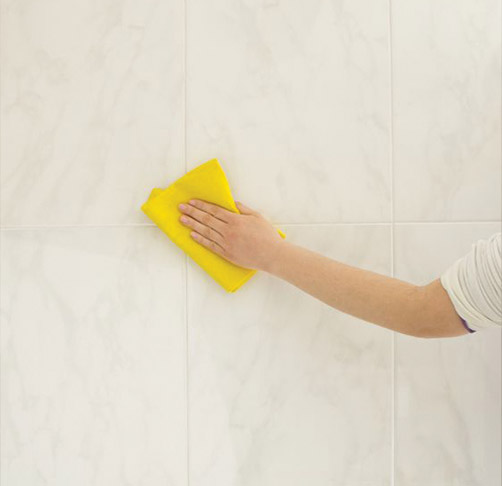Every new home goes through an adjustment process during the first few months that it is occupied. While we have a comprehensive warranty program, it is important that you as the owner of a new home institute your own program of regular but simple maintenance to protect the value of your new home. This program of homeowner maintenance should start the day you move in to your home and is particularly important during the first few months of occupancy.
The tips in this section cover many of the situations that you may encounter and will prove helpful. We are proud of the quality that we build into every Universal Home. We are confident that your homeowner maintenance program together with our comprehensive program of warranty and service will ensure your satisfaction in your new home.
BATHROOM MAINTENANCE
Regularly clean bathroom fixtures to avoid soap scum build up and discoloration due to hard water. Do not use abrasive cleaners as they will create scratches on the surface.
Grouting around the sinks may crack and peel off and allow water to seep below into cabinets. Regular inspection followed by regrouting using a silicone sealant will help you avoid costly repairs.
Glazed wall tiles in the bath area are subjected to more use than other areas and the
simplest long-term maintenance is not to let surface soil build up. Wipe it down with a towel after use. Soap scum or hard water film will not accumulate and mildew will not develop. If mildew develops in the tile joints, vigorous scrubbing with a stiff brush and a good household cleaner will remove the discoloration.
Kitchen Maintenance
Granite counter tops are attractive and easy to maintain. To clean the countertop use a soft cloth dipped in a mild solution of anti-bacterial soap and warm water. Avoid chemical cleaners and those with acidic substances such as vinegar and lemon. Glass cleaners tend to build up a film that can cloud the appearance of the counter top.
Cabinet shutters should be cleaned periodically with mild soap and water. Avoid abrasive cleaners. Over time, due to grease, dust and dirt accumulation, cabinets can appear dull or may have stains from moisture exposure. Sponge off the cabinet face with ammonia water to restore full lustre. If necessary, cabinet doors can be adjusted by simply loosening the screws and re-aligning the door.
Electrical
Wiring in your home has been designed and installed to meet national standards of safety and performance. The electrical system has been divided into a number of circuits to prevent overloading. Do not plug in too many appliances into a single socket.
Most electrical problems are caused by the poor condition of electrical cords, extension cords and plugs. At the first sign of damage, replace them.
Plumbing
Avoid discarding any clogging materials into sinks and toilet bowls. Do not pour grease down your drain and remove hair and lint from sinks to avoid clogging.
To prevent the build up of residual grease and soap, perform a simple monthly maintenance routine; run hot water through drain, add three tablespoons of washing soda, add a little hot water, let stand for 15 minutes; then flush by running water.
It is normal for faucets to drip some water after use. Over-tightening the handle can damage the seal that stops the water flow.
Flooring Tiles
Ceramic or vitrified floor tiles are the most economical and easiest to maintain of all flooring material. The gaps between the tiles which are grouted are the only places where dirt tends to accumulate. Clean your tiles with a non-acidic cleaner to prevent the grouting from coming off.
Wiping your tiles once a week with a solution of white vinegar and water in a ratio of 1:4 will keep them gleaming.

